-
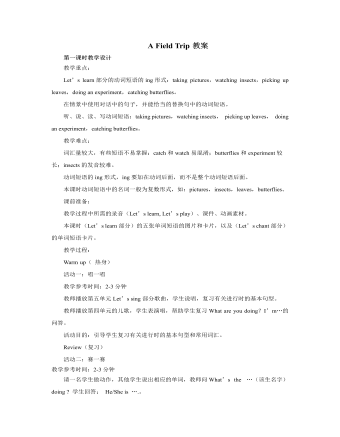
人教版新课标PEP小学英语五年级下册A Field Trip教案
活动八:Story time:教学参考时间:5-7分钟打开书,学生自己阅读故事。两人一小组,尝试初步朗读。小组间互相提问回答:一人问,另一人回答。有两个人都不明白的问题,向全班提问。教师提问:(如果这些问题已经被同学问过了就不用再问了。)Is Zoom reading a book?Is he fishing?Are the frogs playing in the river?Are they catching mosquitoes?What are the frogs doing?教师播放故事录音,学生跟读。教师启发学生说一说从故事中学到了什么。教师要适时告诉学生青蛙是人类的朋友,要爱护青蛙。活动目的:Story time的教学,是培养学生阅读能力的有效载体,教师应充分利用。教师要给孩子充分的时间让孩子能够实实在在的进行阅读,从阅读中获得信息。经过了两年的学习,学生应该具备了初步的阅读小故事的方法,因此教师可以引导有能力的学生在原有的基础上,运用已经学过的语言,对故事进行简单的复述。这样做一方面可以检查学生理解的程度,另一方面可以进一步培养、锻炼学生的语言表达能力。
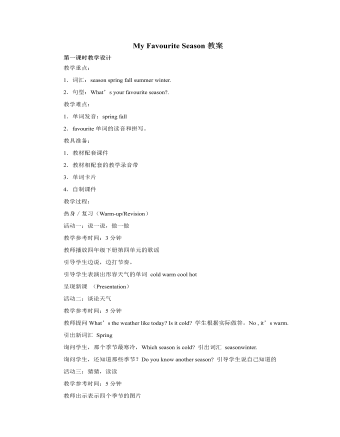
人教版新课标PEP小学英语五年级下册My Favourite Season教案
(三)趣味操练 (Practice)活动六:猜一猜教学参考时间:5教师说:Guess what’s my favourite season. Why?学生猜测:It’s winter. Because you can skate. 教师给予肯定或否定的答案然后邀请另一名孩子起来,大家继续猜测活动七:传话游戏教学参考时间:3分钟教师在每个小组第一个同学耳边轻声说一个句子:I like summer, because I can swim./I like fall, because I can find many beautiful defoliation.(落叶)/….每个小组传话,看谁传的又快又好每组的最后一个汇报你听到的句子(四)巩固和扩展(Consolidation and extension)活动八:Link and say教学参考时间:5分钟完成活动手册P13—3两人一小组,分别说说每组图代表的季节,服装,和事情教师提问,What would you like to do in spring/in summer/in winter/ in fall?,请孩子回答。两人一组问答,根据你听到的连出出对方喜欢的季节事情两个人交换书对答案活动九:Let’s do a survey 教学参考时间:5分钟完成活动手册P13—4自己认读范例对话,明确题意小组调查(6人)各小组展示答案活动十:试一试(Let’s try)教学参考时间:5分钟教师播放录音,学生理解再听录音,选择你听到的图
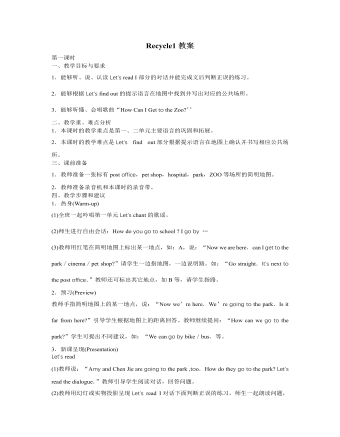
人教版新课标PEP小学英语六年级上册Recycle1教案
1.热身(warm-up) (1)全班齐唱歌曲“How call I Get to the Zoo?’’ (2)师生一起吟唱第一单元的歌谣,要求学生一边吟唱,一边用手打节拍。 2.预习(Preview) 教师对学生有关My Dream Vacation的短文做出总体评价,并请几名写得有创意的学生朗读他们的短文,教师针对其内容提问,如:“Where are you going? What are you going to do? How are you going to there等。教师根据课前的准备,在最后一名学生朗读完文章并回答了问题以后,简化并板书该学生的回答,将其改编成为一首小歌谣,如: Where are you going? What are you going to do? I’m going to the ZOO to see the monkeys. I’m going by bike.I’m going On foot. I live near the ZOO.So I won’t take a train. 教师拍节拍示范朗读自己改写的新歌谣,学生模仿吟唱新歌谣。 3.新课呈现(Presentation) Let’s chant 在以上活动的基础上,教师放Let’s chant部分的录音,学生静听并试着跟读,再看着文字吟唱。师生可进行问答式吟唱,并在小组间展开比赛。 Listen and match
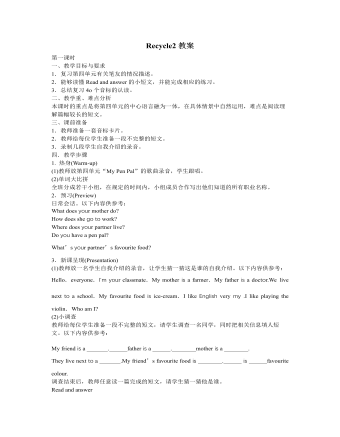
人教版新课标PEP小学英语六年级上册Recycle2教案
2.预习(Preview) 看字母,说职业 教师出示职业名称单词的首字母,让学生说出整个单词。如:w-writer;d-driver/doctor,a-accountant/actor/actress;T-TV reporter等o 3.新课呈现(Presentation) (1)从看字母说职业名称引出TV reporter,教师拿出一些名人照片说:“Now you’re a TV reporter.You’re going to interview a famous person.You don’t know who he/she is .But you know he/she is someone in the pictures.”给学生五次提问的机会,让他们根据教师的回答找出正确的人物。以下问题供参考: What does he/she do? What’s h is hobby ? Is he strong/thin/tall? Where does he/she live? (2)心有灵犀 请两名学生(sl和s2)上来,每人拿着纸和笔分别站在教室的两边。教师提问:“What does s1’s father do?”站在台上的两名学生分别把答案写在各自的纸上。如果两人的答案完全相同,两人就算获胜。教师继续问问题“What does …’s…do?”全体学生一起写出答案,谁写的答案正确就可以得一分。 Listen and match (1)教师说:“Do you want to know more about Liu Yun?’’学生回答后教师说:“Please listen and find out.’’教师放本部分录音,学生认真听。
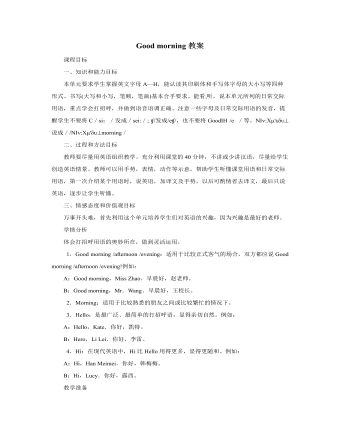
人教版新目标初中英语七年级上册Good morning教案
一、知识和能力目标本单元要求学生掌握英文字母A—H,能认读其印刷体和手写体字母的大小写等四种形式。书写(大写和小写,笔顺,笔画)基本合乎要求。能看,听,说本单元所列的日常交际用语,重点学会打招呼,并做到语音语调正确。注意一些字母及日常交际用语的发音,提醒学生不要将C/si:/发成/sei:/; ?/发成/e?/,也不要将Good?H /e /等。??????'????说成/???????'???morning/二、过程和方法目标教师要尽量用英语组织教学。充分利用课堂的40分钟,不讲或少讲汉语,尽量给学生创造英语情景。教师可以用手势,表情,动作等示意,帮助学生听懂课堂用语和日常交际用语,第一次介绍某个用语时,说英语,加译文及手势,以后可酌情省去译文,最后只说英语,逐步让学生听懂。
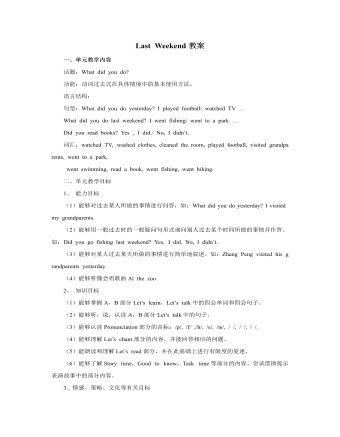
人教版新课标PEP小学英语六年级下册Last Weekend教案
一、教学内容:Part B Let’s learn Let’s play. Part C Task time Let’s check 二、教学目标与要求 1、掌握四会词组:went to a park, went swimming, read a book, went fishing, went hiking. 2、学会用句型What did you/ (name) do last weekend/ yesterday? I(name) (did) last weekend/ yesterday. Did you….? Yes, I did. 来进行问答并完成Task time的表格。 三、教学重点 掌握四会词组,并用所学词组和句型进行调查 四、教学难点 掌握四会词组(不规则动词过去式变化),并用所学词组和句型进行调查 五、课前准备 1、教师准备所需的词卡及图片。 2、学生准备词卡。 六、教学过程 1、Warm-up 1) Free-talk: T: What day is today? A: Today is… T: What day was yesterday? (强调 yesterday) B: Yesterday/ It was… T: What did you do yesterday? C: I (did)…yesterday. ( 用前几课时已经学的词组) 2) Chain-drill: C: I (did)…yesterday. What did you do yesterday? D: I (did)…yesterday. What did you do yesterday? E, F… (ask the teacher) T: I went to a park yesterday. 2、Presentation and practice let’s learn (1)继续Chain-drill,由T 引出并出示新授词组:went hiking. (2)学生已经了解了go 的过去式后, T 边用I went ( 这个动词用动作表示)yesterday.表达自己昨天去做什么了,边做动作.让学生帮老师说出: went swimming, went fishing.
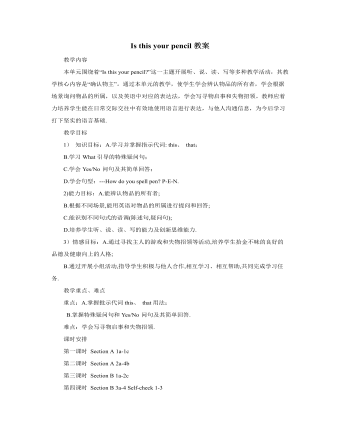
人教版新目标初中英语七年级上册Is this your pencil教案
T: Please look at the pictures and learn the new words.(用多媒体展示新单词效果较好。)1.at prep. 在(里面或附近);在(点刻);2.theart.表示特指的人、物、事或群体 3.lostadj.丢失的;遗失的4.Found adj. (find的过去式、过去分词)找回的5.lost and found 失物招领6.please adv.请7.school n. 学校8.a set of一套;一副(Teach students to read the words.)2. Practice the new words. (事先录制一段短的听力,让学生通过听的训练来强化所学的新单词,并为学习写寻物启示和失物招领作好准备。)T: Please listen to a short passage twice then fill the blanks using the words we learned.(Show students a short passage and play the recording for the students to listen.)There are many things in (1)_____________________in my (2)__________. Look, here’s (3)_________keys. Is this yours? (4)__________call Jim (5)___________753-2289.Typescript:There are many things in the Lost and Found in my school. Look, here’s a set of keys. Is this yours? Please call Jim at 753-2289.
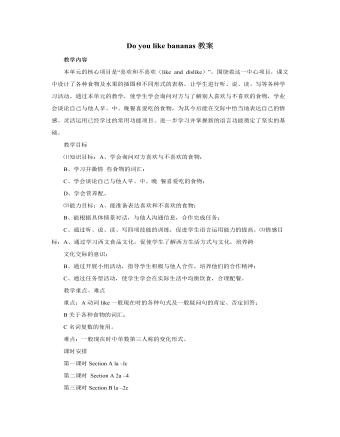
人教版新目标初中英语七年级上册Do you like bananas教案
教学目标 ⑴知识目标:A、学会询问对方喜欢与不喜欢的食物; B、学习并激情 些食物的词汇; C、学会谈论自己与他人早、中、晚 餐喜爱吃的食物; D、学会营养配。 ⑵能力目标:A、能准备表达喜欢和不喜欢的食物; B、能根据具体情景对话,与他人沟通信息,合作完成任务; C、通过听、说、读、写四项技能的训练,促进学生语言运用能力的提高。⑶情感目标:A、通过学习西文食品文化,促使学生了解西方生活方式与文化,培养跨 文化交际的意识; B、通过开展小组活动,指导学生积极与他人合作,培养他们的合作精神; C、通过任务型活动,使学生学会在实际生活中均衡饮食,合理配餐。 教学重点、难点 重点:A动词like一般现在时的各种句式及一般疑问句的肯定、否定回答; B关于各种食物的词汇; C名词复数的使用。 难点:一般现在时中单数第三人称的变化形式。
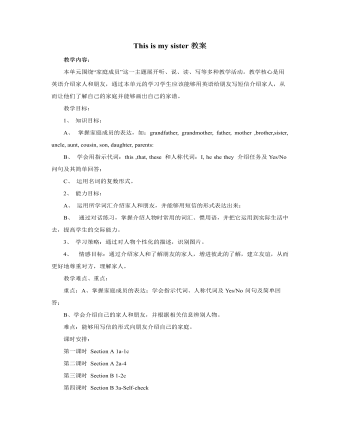
人教版新目标初中英语七年级上册This is my sister教案
(Play the recording twice again.) (Check the answer.) ③Pairwork. Draw your own picture and talk about it. T: We find out the picture of Lin Hai’s family. Can you draw a picture of your family? SS: … T: OK. When you finish drawing, tell your partner about your picture. You can use “This is …” and “ These are …” to talk about. Then report it to the class. (Students work.) (Check students’ work. Ask two or three students to report.) Step Three: Task. Talk about the family tree. T: Look at the family tree. I think it’s a big family. You can do it in groups of four or three. You can do it in pairs or only by yourself. Then report it to the class. (Students work. Teacher walks around in the classroom and helps the students.) T: Stop here. Let’s check it out. (Choose students to do it.) S1: Look at my family tree. This is my… This is my … They have two … This is my … This is my …This is my …This is my. My parents have two children. This is…This is my …My uncle and my aunt have a son. He is my … (Ask two more students to do it.) Homework. Write a passage about your family.
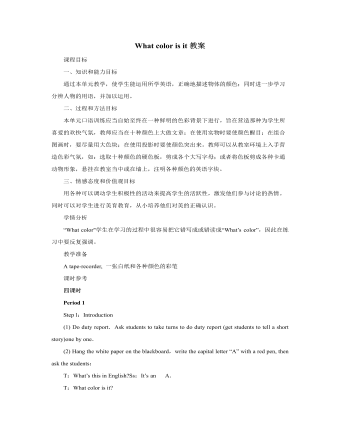
人教版新目标初中英语七年级上册What color is it教案
一、知识和能力目标通过本单元教学,使学生能运用所学英语,正确地描述物体的颜色;同时进一步学习分辨人物的用语,并加以运用。二、过程和方法目标本单元口语训练应当自始至终在一种鲜明的色彩背景下进行,旨在营造那种为学生所喜爱的欢快气氛,教师应当在十种颜色上大做文章;在使用实物时要使颜色醒目;在组合图画时,要尽量用大色块;在使用投影时要使颜色突出来。教师可以从教室环境上入手营造色彩气氛,如:选取十种颜色的硬色板,剪成各个大写字母;或者将色板剪成各种卡通动物形象,悬挂在教室当中或在墙上,注明各种颜色的英语字块。三、情感态度和价值观目标用各种可以调动学生积极性的活动来提高学生的活跃性,激发他们参与讨论的热情。同时可以对学生进行美育教育,从小培养他们对美的正确认识。
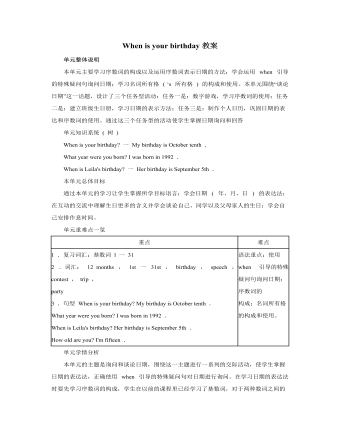
人教版新目标初中英语七年级上册When is your birthday教案
本单元主要学习名词所有格 ('s 所有格 ) 的构成和使用。在初次接触 “ 名词所有格 ” 时,学生较难理解的可能是 “ 所有格 ” 这个名称,对于它的构成,学生也许会觉得较容易。教师可通俗地告诉学生 “ 所有格 ” 的意思是表示 “…… 的 ” ,这样学生反而容易接受。在使用 “ 名词所有格 ” 形式时,学生容易犯错误或混淆的主要是:将这种一 's 构成形式与 is 的缩写形式混淆,如: My father's name's Jin Zhi .,可以这样告诉学生:名词所有格的后面一般应接名词;勿将这种一 's 结构盲目套用与人称代词上,代替物主代词使用,如 He's father's name is Li Cheng 。在教学初期,可不讲授名词所有格的其它形式,待时机成熟,再向学生介绍复数名词所有格形式的结构一 ' ,如: the students' bikes 。 Self Check 教学内容 Self Check( 教材 P52) 教学目标 知识与能力 复习词汇 birthday , date , month , January , February , March , April , May , June , July , August , September , October , November , December , date , birth , age , old , speech . contest . trip , party , event , an , festival , pop , concert , chorus , lecture , music ;引导学生复习、巩固“询问和谈论日期”的目标语言并运用所学知识安排活动。
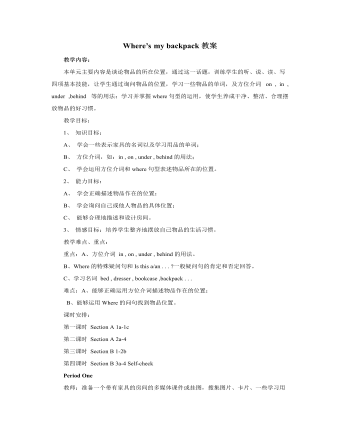
人教版新目标初中英语七年级上册Where’s my backpack教案
教师: 搜集单词卡片、背景资料。 学生:彩笔、大白纸、相关新单词。 教学设计 Step One: Learn the new words. 1.Present the new words. (Show some pictures and words on the screen to teach the students the new words.) T: What’s this? S1: It’s a room. T: Do you have a room like this? S2: Yes, I do./ No, I don’t. T: Read after me. R-O-O-M, room. Ss: R-O-O-M, room. (Teach the other words “TV, desk, picture” in the same way.) T: There are some words here. Read the words after me and spell them. (Learn the other words without pictures on the cards.) T: This is a word. Can you spell this word? (Point to a word in the card.) S1: Yes, I can. / No, I can’t. (Let them know the meaning of “can”.) T: I can spell your name. Can you spell my name? S1: Yes, I can. T: Can you write your name? S: Sorry, I can’t. I have no pen. T: You need a pen.( Give him a pen.) ( Let the students understand the word “need”.) T: I bring a football to school every day. Now it is on the floor. After class I take it to my home. (Teach “bring” and “take”. Put a football on the floor and point to the floor to teach the word “floor”.) 2.Practice the words. (Give the examples to the students and get the students to understand the new words.) Step To Listen and practice.
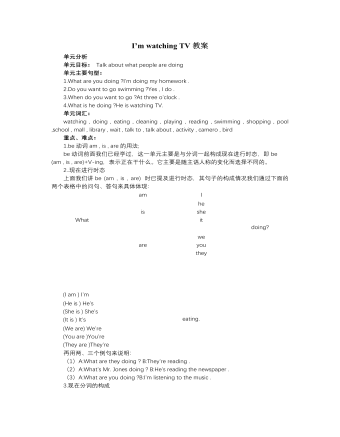
人教版新目标初中英语七年级下册I’m watching TV教案
单元分析单元目标: Talk about what people are doing 单元主要句型:1.What are you doing ?I’m doing my homework .2.Do you want to go swimming ?Yes , I do .3.When do you want to go ?At three o’clock .4.What is he doing ?He is watching TV. 单元词汇:watching , doing , eating , cleaning , playing , reading , swimming , shopping , pool ,school , mall , library , wait , talk to , talk about , activity , camero , bird 重点、难点:1.be动词am , is , are的用法;be动词前面我们已经学过,这一单元主要是与分词一起构成现在进行时态,即be (am , is , are)+V-ing,表示正在干什么。它主要是随主语人称的变化而选择不同的。2..现在进行时态上面我们讲be (am , is , are) 时已提及进行时态,其句子的构成情况我们通过下面的两个表格中的问句、答句来具体体现:3.现在分词的构成现在进行时态中be + V - ing 的构成中V-ing被称为现在分词,它的基本构成是动词原形+ing,但也有些特殊情况,下面分几类说明:(1)一般情况+ing如:read→reading,go→going,do→doing,look→looking,listen→listening,watch→watching.(2)以不发音的e结尾的词,去掉e,再加ing.如:write→writing,skate→skating,type→typing,wake→waking,make→making
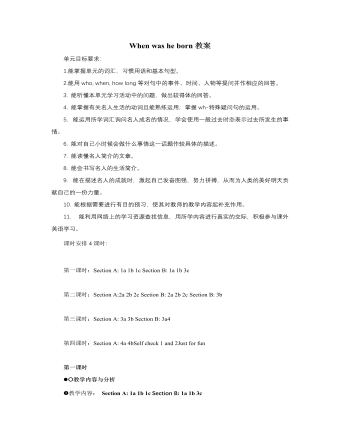
人教版新目标初中英语八年级上册When was he born教案
1.能掌握单元的词汇,习惯用语和基本句型。2.能用who, when, how long等对句中的事件、时间、人物等提问并作相应的回答。3. 能听懂本单元学习活动中的问题,做出较得体的回答。4. 能掌握有关名人生活的动词且能熟练运用;掌握wh-特殊疑问句的运用。5. 能运用所学词汇询问名人成名的情况,学会使用一般过去时态表示过去所发生的事情。 6. 能对自己小时候会做什么事情这一话题作较具体的描述。7. 能读懂名人简介的文章。8. 能会书写名人的生活简介。9. 能在描述名人的成就时,激起自己发奋图强,努力拼搏,从而为人类的美好明天贡献自己的一份力量。10. 能根据需要进行有目的预习,使其对教师的教学内容起补充作用。11. 能利用网络上的学习资源查找信息,用所学内容进行真实的交际,积极参与课外英语学习。课时安排4课时:第一课时:Section A: 1a 1b 1c Section B: 1a 1b 3c第二课时:Section A:2a 2b 2c Section B: 2a 2b 2c Section B: 3b
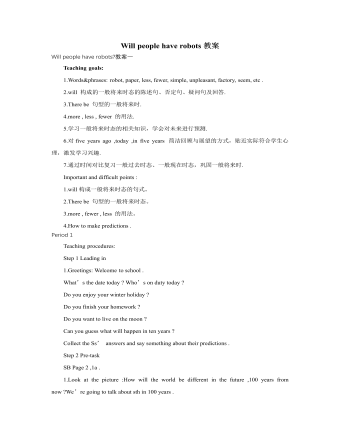
人教版新目标初中英语八年级下册Will people have robots教案
Teaching goals:1.Words&phrases: robot, paper, less, fewer, simple, unpleasant, factory, seem, etc .2.will 构成的一般将来时态的陈述句、否定句、疑问句及回答.3.There be 句型的一般将来时.4.more , less , fewer 的用法.5.学习一般将来时态的相关知识,学会对未来进行预测.6.对five years ago ,today ,in five years 简洁回顾与展望的方式,贴近实际符合学生心理,激发学习兴趣.7.通过时间对比复习一般过去时态、一般现在时态,巩固一般将来时.Important and difficult points :1.will构成一般将来时态的句式。2.There be 句型的一般将来时态。3.more , fewer , less 的用法。4.How to make predictions .Period 1Teaching procedures:Step 1 Leading in1.Greetings: Welcome to school .What’s the date today ? Who’s on duty today ?Do you enjoy your winter holiday ?Do you finish your homework ?Do you want to live on the moon ?Can you guess what will happen in ten years ?Collect the Ss’ answers and say something about their predictions .Step 2 Pre-taskSB Page 2 ,1a .1.Look at the picture :How will the world be different in the future ,100 years from now ?We’re going to talk about sth in 100 years .
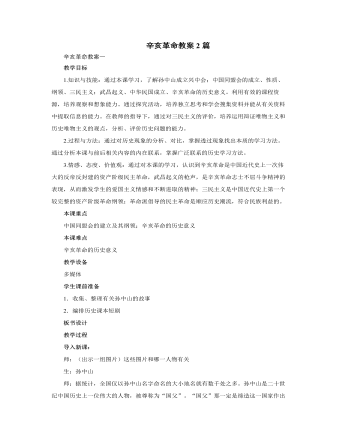
人教版高中历史必修1辛亥革命教案2篇
①从政府人员组成看,南京政府是一个以资产阶级革命派为主体的政府。②从政府颁发的法令和措施看,这些法令体现了资产阶级民主革命的要求,对于发展民族资本主义经济、资产阶级民主政治和文化教育以及改革社会风气,都起了积极作用。③从颁布的《中华民国临时约法》看,宪法体现了三权分立的政治体制,体现了资产阶级民主主义的要求,是中国历史上第一部资产阶级民主宪法,具有反封建专制制度的进步意义。(2)从南京临时政府的内外政策分析南京政府的根本弱点①未彻底地反封建。它没有采取比较彻底的反对封建主义的措施,特别是对封建统治的基础——地主阶级土地所有制没有触动,这样,南京临时政府也就不能真正地把广大人民群众动员起来,因而缺乏真正的群众基础。
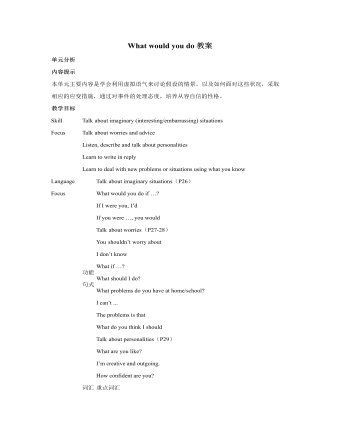
人教版新目标初中英语九年级上册What would you do教案
本课采用任务型教学法,用What would you do if you had a million dollars?这个问句,引出谈论假想情况的话题。 采用提问、启发和归纳的教法,让学生易于接受教材内容,培养学生的语言运用能力。 四、 教学过程设计 Step Ⅰ. Greet the whole class as usual. Step Ⅱ. Warming-up T: Do you have ten Yuan in your pocket? S1: No, I don’t. T: (Take out ten Yuan and give it to the student) OK, never mind. What would you do if it was yours? What would you do if you had ten Yuan? S1: I would buy snacks. T: OK, thank you. Sit down, please. (To the whole class) Just now, it was only ten Yuan. What about 100 Yuan? What would you doif you had 100 Yuan? S2: I’d buy a beautiful jacket. T: Thank you. (To the whole class) Now suppose you had a million dollars, what would you do? We know thatone dollar nearly equals eight Yuan, so that’s a large sum of money. Think it over carefully and tellme your ideas. What would you do if you had a million dollars? S3: I’d buy a big house. S4: I’d buy a sports car. S5: I’d put it in the bank. T: OK, stop here. Please look at the blackboard and guess what would I do if I had a million
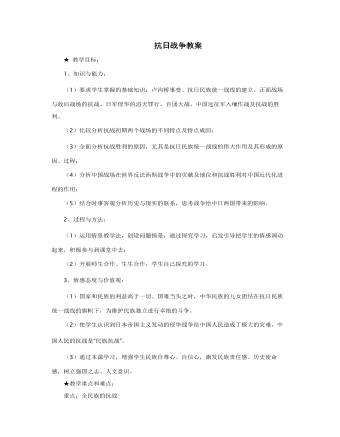
人教版高中历史必修1抗日战争教案
【备课资料】百团大战八路军从8月20日起,在华北敌后出动105个团,约40万兵力,在2500公里长的战线上,发动了规模最大的“以彻底破坏正太路若干要隘,消灭部分敌人截断该线交通”为目的的举世闻名的“百团大战”。八路军提出“不留一根铁轨、不留一根枕木、不留一个车站、不留一个碉堡、不留一座桥梁”的口号,“让敌人用脚同我们赛跑”,“让敌人用牛驴搬炮弹、飞机大炮”。八路军展开攻坚战,端掉敌一系列据点。据有关资料记载,从8月20日到12月5日,在历时三个半月的“百四大战”中,我军共进行大小战斗1824次,毙伤日伪军25800余人,俘日伪军18600余人,缴获了大批武器、弹药和军用食品等;破坏铁路470多公里,公路1500多公里,桥梁、车站、隧道等260余处,使正太铁路停运月余;攻克日伪据点2993个,巩固和扩大了抗日军民占领区。
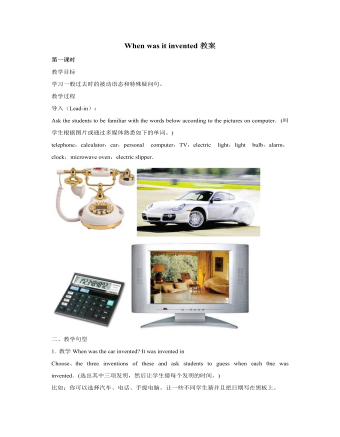
人教版新目标初中英语九年级下册When was it invented教案
二、教学 1a,1b.1.First the teacher asks the students what kind of fruit food and drink you like the best and writes down on the blackboard.教师问学生最喜欢什么水果和饮料并把它们写在黑板上。比如:potato chips,ice cream,tea,lemon,chocolate,oranges,salad,popcorn,pickle and so on.2.接着叫学生表达以上食物的味道,引出新单词——sweet,crispy,salty,sour,delicious,hot,awful,nice…并且完成lb教学内容通过此活动,以旧带新引入新单词。其目的是让学生自主学习新知识。 三、教学 2a,2b1.首先,听力前的brainstormFirst,Let students describe how potato chips taste and describe how helpful the potato chips.Then,ask:When and where were potato chips invented?Who were potato chips invented by?How were potato chips invented?(Let students guess according to the following key words.)Key words:by accident,customer,restaurant,by mistake.(说明:通过问题让学生对对话内容有整体了解,为听力练习做好准备;又培养学生的注意力,想像力,观察力。)
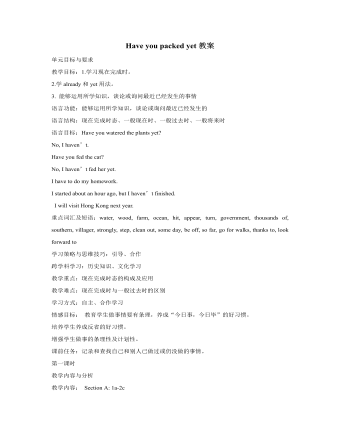
人教版新目标初中英语九年级下册Have you packed yet教案
教学目标:1.学习现在完成时。2.学already和yet用法。3. 能够运用所学知识,谈论或询问最近已经发生的事情语言功能:能够运用所学知识,谈论或询问最近已经发生的语言结构:现在完成时态、一般现在时、一般过去时、一般将来时语言目标:Have you watered the plants yet?No, I haven’t.Have you fed the cat?No, I haven’t fed her yet.I have to do my homework. I started about an hour ago, but I haven’t finished. I will visit Hong Kong next year.重点词汇及短语:water, wood, farm, ocean, hit, appear, turn, government, thousands of, southern, villager, strongly, step, clean out, some day, be off, so far, go for walks, thanks to, look forward to学习策略与思维技巧:引导、合作跨学科学习:历史知识、文化学习教学重点:现在完成时态的构成及应用教学难点:现在完成时与一般过去时的区别 学习方式:自主、合作学习 情感目标: 教育学生做事情要有条理,养成“今日事,今日毕”的好习惯。培养学生养成反省的好习惯。增强学生做事的条理性及计划性。课前任务:记录和查找自己和别人已做过或仍没做的事情。